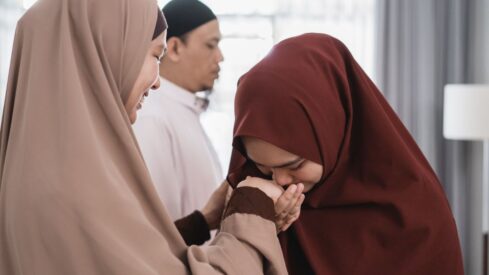This article discusses a series of Qur’anic verses, then the hadith that outline the Muslims’ duties towards one’s parents especially in respect of Prayer and worship for them. It shows the relationship between parents and their children, in particular the duties children owe towards their parent whilst they are alive. Then it explains the duty to pray for one’s parents if they are deceased, and concludes with the argument that indeed we should pray for our parents and feel the benefit of such worship with reward form Allah and higher ranking in one’s status.
Qur’an 46, verse (15)
“And we have enjoined on man doing good to his parents, with trouble did his mother bear him and with trouble did she bring him forth, and the bearing of him and his weaning was thirty months. Until when he reaches maturity and reaches forty years, he says, My Lord! grant me that I may give thanks for the favour which though has bestowed on me and my parents, and that I may do good that pleases thee and do good to me in respect of my offspring, surely, I turn to thee and surely, I am one of those who submit.”
This supplication can be made by the child for his parents even if they are alive in heaven. Giving thanks is the main aim here for one’s parents to Allah SWT and all the benefits they bring us.
Qur’an 31, verse (14)
And we have enjoined on man in respect of his parents – his mother bears him with hardship upon hardship and his weaning takes two years-saying be grateful to me and to both your parents, to me is the eventual coming.
Again, Allah wishes us to supplicate towards him to be grateful in our duas and to be grateful to our parents as they did undergo suffering on our behalf.
Qur’an 29, verse (8)
And we have enjoined on man goodness to his parents and if they contend with you that you should associate others with me of which you have no knowledge do not obey them, to me is you return, so I will inform you of what you did.
This verse requires a careful balance between one’s duty towards one’s parents and our duty towards Allah. Allah comes first but that does not stop us praying to Allah for our parents to be forgiven and guided to the right path. And such a test is one that supplication can be the answer to.
Qur’an 4, verse (36)
And serve Allah and do not associate anything with him and be good to you parents, and to the near of kin, and the orphans and the needy and the neighbour of your kin and the alien neighbour, and the companion in a journey and the wayfarer and those whom our right hands possess, surely Allah does not love him who is proud and boastful.
Here we can see that we can obtain love form Allah in the form of Al Wadud blessing if we are good to our parents. Supplication should be made to make us good towards our parents and to obey the ayat with help from Allah.
Qur’an 17, verse (23)
And your Lord has commanded that you shall not serve any but him, and goodness to your parents. if either or both of them reach old age say not to them as much as the word ough nor chide them and speak to them a generous word.
This verse reminds us that parents can become helpless with old age. We owe a duty to care for them or to arrange care for them. We are not to chide them for their elderliness, but to do good to them. Again, we can supplicate to Allah to make us care for them and to provide the means by which we can care for them.
Qur’an 6, verse (151)
Say come I will receive what your Lord has forbidden you-remember that you do not associate anything with him and show kindness to your parents and do not slay your children for fear of poverty we provide for you and for them, and do not draw nigh to indecencies, those of them which are apparent and those which are concealed, and do not kill the soul which Allah has forbidden except for the requirements of justice; this he has enjoined you that you may understand.
This verse has a slightly different focus by requiring kindness towards parents which again supplication can be made for. In fact turning to our Lord to make us obey the verse and bless us with the means by which we can obey the verses is looked at favourably by Allah, who rewards worship in many ways.
Qur’an 27, verse (19)
So he smiled at her word and said “My Lord grant me that I should be grateful for thy favour which though has bestowed upon me and my parents and wishes to do good thou is pleased with, and make me enter by thy mercy into thy servants the good ones.”
This is Sulaiman’s dua for his parents which can be followed.
Qur’an 14, verse (41)
“O our Lord grant me protection and my parents and all the believers in the day when the reckoning will come to pass.”
This is dua by Ibrahim, which again can be followed.
Qur’an 71, verse (28)
“My Lord forgive me and my parents and those who enter my house believing, and the believing men and the believing women, and do not increase the unjust in nought but destruction.”
This is dua by the prophet Nuh which again can be followed.
There is great blessing in following the Prophets example and the sharia towards parents is reiterated by the Prophethood of Muhammad pbuh and upon all the Prophets mentioned here.
As we can see form above, there is an obligation and duty towards one’s parents. The duty to pray for them is found and reiterated throughout the Qur’an especially in these verses. Also, supplication was made for their parents by the Prophets of Nuh, Sulaiman and Ibrahim.
The following hadiths also rule on the matter, with discussion at the end of which require worship for one’s parents especially after they have passed away.
It is reported that a person said to the messenger who amongst the people is most deserving of my good treatment? He said: your mother, again your mother, again your mother, then your father. [Sahih Muslim 2548b]
Another Hadith says:
The messenger was asked O messenger of Allah which deed is best? He said, prayer in its proper time, what is next? Good treatment of your parents. What is next? Jihad in the way of Allah.
[Sahih al Bukhari]
This hadith places sincere worship of Allah in front of good treatment of parents.
It was also reported in a hadith that:
The mother is the middle of the doors of paradise
[Ibn Hanbal v 198]
The way to paradise is through good treatment of mothers
In another Hadith
Paradise is under the feet of mothers
Sunan an-Nasa’i Jihad, 6
Again the way to paradise is good treatment of mothers
In another acceptable Hadith
The Prophet said that it will be said to children on the day of resurrection Enter paradise. They will say our Lord, not unless our fathers and mothers enter. Allah will say, why do I see them hesitant to enter paradise? They will say “oh our Lord our fathers and mothers.” Allah will say enter paradise, all of you and your parents.
Musnad Ahmad 16971
Children are naturally inclined to care for their parents and to be concerned for them on judgment day is an example of the love and mercy Allah has placed between children and their parents.
Another Hadith
The messenger of Allah pbuh, said. When the human being dies, his deeds end except for three; ongoing charity, beneficial knowledge, and a righteous child that prays for him.
Sahih Muslim 1631
Finally, a person should provide for his death in three ways, or have relatives provide for him after his death.
On-going charity in his or her name such as all and any of the verses in the Qur’an that preach Zakat.
Beneficial knowledge in the way of Producing Korans and hadith to donate to people
A righteous child who prays for his parents in the way outlined above, brings benefit to his parents.
It can be concluded that several points to note about parents. They deserve our respect, kind treatment, obedience, provision and sustenance, and perhaps most importantly of all our sincere worship to Allah for their benefit in multifarious ways. If they have passed away, then going through the relevant sharia and supplicating as directed will allow them to receive ongoing benefit in the garden, and when they reach the garden. And Allah knows best.
By Nabela K M Ahmad


















